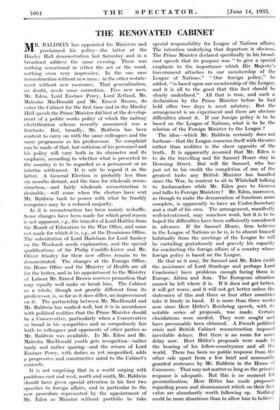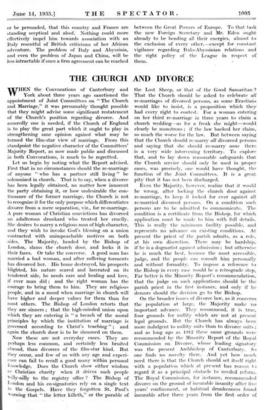THE RENOVATED CABINET
MR. BALDWIN has appointed his Ministers and proclaimed his policy—the latter at the Himley Hall demonstration last Saturday and in a broadcast address the same evening. There was nothing sensational in either the act or the word, nothing even very impressive. In the one case reconstruction without new men ; in the other restate- ment without new measures. That generalization, no doubt, needs some correction. Five new men, Mr. Eden, Lord Eustace Percy, Lord Zetland, Mr. Malcolm MacDonald ,and Mr. Ernest Brown, do enter the Cabinet for the first time and in the Himley Hall speech the Prime Minister did hint at the develop- ment of a public works policy of which the railway electrification scheme recently announced was a foretaste. But, broadly, Mr. Baldwin has been content to carry on with the same colleagues and the same programme as his predecessor. No complaint can be made of that, but criticism of his personnel and his policy will vary both in its character and its emphasis, according to whether what is presented to the country is to be regarded as a permanent or an interim settlement. It is safe to regard it as the latter. A General Election is probably less than six months distant, and the time for wholesale recon- struction,—and fairly wholesale reconstruction is desirable,—will come when the electors have sent Mr. Baldwin back to power with what he frankly recognizes may be a reduced majority.
As it is reconstruction has been mainly reshuffle. Some changes have been made for which good reason is not apparent, e.g., the transfer of Lord Halifax from the Board of Education to the War Office, and some not made for which it is, e.g., at the Dominions Office. The substitution of Lord Hailsham for Lord Sankey on the Woolsack needs explanation, and the special qualifications of Sir Philip Cunliffe-Lister and Mr. Oliver Stanley for their new offices remain to be demonstrated. The changes at the Foreign Office, the Home Office and the Ministry of Health are all for the better, and in his appointment to the Ministry of Labour Mr. Ernest Brown receives promotion that may equally well make or break him. The Cabinet as a whole, though not greatly different from its predecessor, is, so far as it does differ, an improvement on it. The partnership between Mr. MacDonald and Mr. Baldwin has worked well, but it is in accordance with political realities that the Prime Minister should be a Conservative, particularly when a Conservative so broad in his sympathies and so scrupulously fair both to colleagues and opponents of other parties as Mr. Baldwin was available. In Mr. Eden and Mr. Malcolm MacDonald youth gets recognition—rather tardy and rather sparingand the return of Lord Eustace Percy, with duties as yet unspecified, adds a progressive and constructive mind to the Cabinet's counsels.
It is not surprising that in a world surging with problems east and west, north and south, Mr. Baldwin should have given special attention in his first two speeches to foreign affairs, and in particular to the new procedure represented by the appointment of Mr. Eden as Minister without portfolio to take special responsibility for League of Nations affairs. The intention underlying that departure is obvious. The Prime Minister declared specifically in his, broad- cast speech that its purpose was " to give a special emphasis to the importance which. His Majesty's Government attaches to our membership of the League of Nations." " Our foreign policy," he added, "is based upon our membership of the. League, and it is all to the good that this fact should be clearly underlined." All that is true, and such a declaration by the Prime Minister before he had held office two days is most salutary. But the arrangement is an experiment and there are obvious difficulties about it. If our foreign policy is to, be based on the League of Nations, what is to, be the relation of the Foreign Minister to the League ?
The idea—which Mr. Baldwin certainly does not harbour—that the League concerns itself with theories rather than realities is the sheer opposite of the truth. It is apparently assumed that Mr. Eden is to do the travelling and Sir Samuel Hoare stay in Downing Street. But will Sir Samuel, who has just set to his credit the completion of one of the greatest tasks any British Minister has handled since the War, be content to sit in Whitehall talking to Ambassadors while Mr. Eden goes to Geneva and talks to Foreign Ministers ? Mr. Eden, moreover, as though to make the demarcation of functions more complete, is apparently to have an Under-Secretary and a staff of his own. The arrangement, manifestly well-intentioned, may somehow work, but it is to be hoped the difficulties have been sufficiently considered in advance. If Sir Samuel Hoare, firm believer in the League of Nations as he is, is to absent himself habitually from the meetings of the League he will be curtailing gratuitously and gravely his capacity for conducting the foreign affairs of a country whose foreign policy is based on the League.
Be that as it may, Sir Samuel and Mr. Eden (with the assistance of Lord Stanhope and perhaps Lord Cranborne) have problems enough facing them in Europe, Africa and Asia. The European situation cannot be left where it is. If it does not get better, it will get worse, and it will not get better unless the statesmen of this and three or four other countries take it firmly in hand. It is more than three weeks now since Herr Hitler's Reichstag speech, with its notable series of proposals, was made. Certain elucidations were needed. They were sought and have presumably been obtained. A French political crisis and British Cabinet reconstruction imposed inevitable delays. But there is no room for more delay now. Herr Hitler's proposals were made in the hearing of his fellow-countrymen and all the world. There has been no public response from the other side apart from a few brief and necessarily guarded sentences by Mr. Baldwin in the House of Commons. That may not matter so long as the private response is adequate. But this is no moment for procrastination. Herr Hitler has made proposals regarding peace and disarmament which on their face value are _abundantly ;worth following up. Nothing could be more disastrous than to allow him to believe: or be persuaded, that this country and France are standing sceptical and aloof. Nothing could. more effectively impel him towards association with an Italy resentful of British criticisms of her African adventure. The problem of Italy and Abyssinia, and even the problem of Japan and China, will be less intractable if once a firm agreement can be reached between the Great Powers of Europe. To that task the new Foreign Secretary and Mr. Eden ought already to be bending all their energies, almost to the exclusion of every other,—except for constant vigilance regarding Italo-Abyssinian relations and the right policy of the League in respect of them.



















































 Previous page
Previous page